

7 Benefits of an Emotional Support Animal Cat for Your Well-Being
by Lena Park
Last updated: July 9, 2025
Verified and Approved by:
Angela Morris,
MSW, LCSW
Fact Checked

Overview
Emotional support animal cats offer profound benefits for well-being, including companionship, comfort, and relief from mental health challenges like anxiety and depression. These cats play a crucial role in fostering emotional stability through their calming presence, which can lead to enhanced mental health outcomes. This is supported by heartfelt testimonials and studies that illustrate their transformative impact on individuals’ lives. By providing a nurturing connection, these cats help individuals navigate their emotional journeys, reminding us of the support available through the companionship of an emotional support animal.
Introduction
In a world where mental health challenges are increasingly prevalent, many individuals find themselves navigating a landscape filled with emotional struggles. The companionship of emotional support animals, particularly cats, emerges as a beacon of hope during these difficult times. These furry friends offer more than just a warm presence; they provide essential emotional support that can alleviate symptoms of anxiety, depression, and PTSD.
As you face the complexities of obtaining an Emotional Support Animal (ESA) letter, know that services like Wellness Wag are here to help, streamlining the process and ensuring quick access to the documentation needed for housing and travel.
This article explores the multifaceted benefits of ESA cats, the legal protections they enjoy, and the profound impact they have on their owners’ quality of life. It is crucial to understand the distinctions between ESAs and service animals, as this knowledge empowers you on your journey.
Through real-life testimonials and expert insights, we will illuminate the transformative power of these beloved companions, showcasing their vital role in fostering emotional stability and well-being.
How might your life change with the support of an ESA? Together, let’s delve into this heartwarming topic.
Wellness Wag: Quick and Reliable ESA Letter Services
Navigating mental health challenges can be incredibly difficult, leaving many feeling isolated and overwhelmed. For those in need of support, an emotional support animal cat can provide a lifeline, offering companionship and comfort during tough times. Wellness Wag understands these struggles and offers a highly efficient process for obtaining ESA letters, ensuring that clients receive valid documentation swiftly.
The journey begins with a brief assessment to determine eligibility, followed by a personalized consultation with licensed medical professionals who truly understand individual needs. Once an order is placed, clients receive a confirmation email detailing their purchase, providing reassurance that help is on the way. Once approved, clients receive their official ESA letter within 24 hours, facilitating access to vital housing and travel accommodations.
This rapid turnaround is crucial for those experiencing immediate mental health challenges, allowing them to secure the companionship of their emotional support animal cat without unnecessary delays. In fact, Wellness Wag has assisted over 1 million individuals in starting their therapy journey, highlighting the platform’s dedication to prompt assistance. Mental health professionals emphasize that quick access to ESA documentation can be vital in alleviating anxiety and enhancing overall well-being.
This underscores the significance of prompt ESA letters in fostering psychological stability. With Wellness Wag’s efficient online process and professional consultations, individuals can find the support they need to enhance their lives. Remember, you are not alone in this journey, and Wellness Wag is here to help you every step of the way.
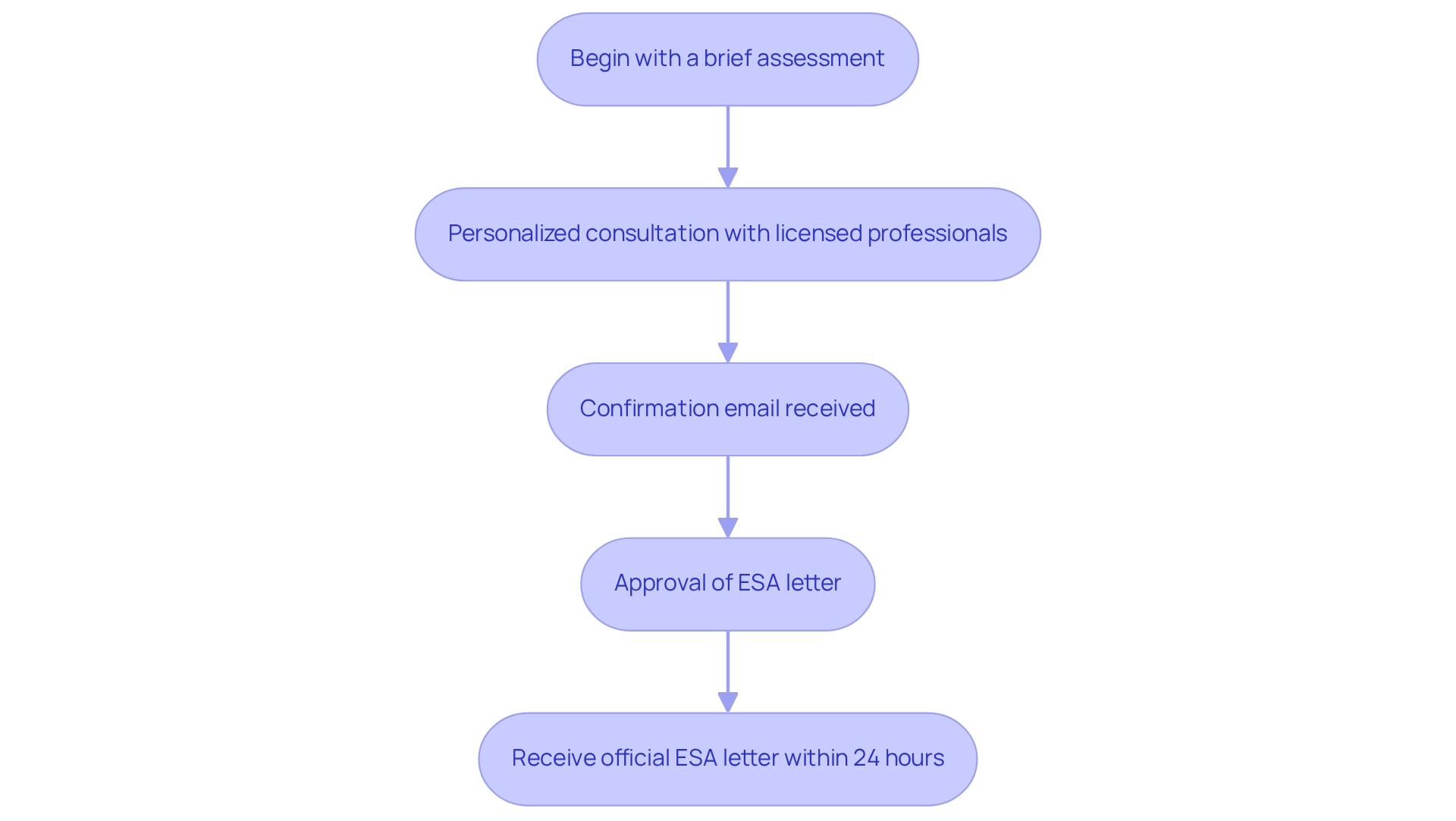
Enhanced Emotional Well-Being Through Cat Companionship
Cats are often celebrated for their soothing presence and their role as emotional support animal cats, showcasing a remarkable ability to bring comfort to those in need. Many individuals struggle with anxiety, depression, and PTSD, and studies reveal that the companionship of an emotional support animal cat can significantly alleviate these symptoms. Just the simple act of petting a cat can trigger the release of oxytocin, a hormone that fosters bonding and reduces stress. Additionally, the playful and affectionate nature of an emotional support animal cat helps counter feelings of isolation, making them exceptional companions for anyone seeking solace.
Have you ever noticed how interacting with a cat can lead to a notable reduction in anxiety? Many people report experiencing decreased depressive symptoms when they spend time with these furry friends. Experts agree that these gentle companions enhance overall well-being, providing comfort during life’s challenging moments. For those considering the practical aspects of welcoming an emotional support animal cat into their lives, obtaining an ESA letter through Wellness Wag is a straightforward process.
One satisfied client, Linda S., shared her experience: “Applying for an ESA through Wellness Wag was the best decision I made. It was an effortless process and the team was very professional.” This heartfelt testimonial underscores the exceptional service and swift approval that Wellness Wag provides, making the journey to emotional assistance more accessible than ever. If you’re feeling overwhelmed, remember that support is available, and an emotional support animal cat could be just the companion you need.
Legal Protections for Emotional Support Cats Under Housing and Travel Laws
Emotional support animal cats play a crucial role in supporting individuals with mental health conditions, and they are afforded important legal protections under the Fair Housing Act and the Air Carrier Access Act. These laws empower individuals to live with their ESAs in pet-restricted housing and travel with them on airlines, ensuring that those who rely on their beloved cats for psychological support can do so without fear of discrimination. Landlords are prohibited from denying tenants with valid ESA letters the right to keep their felines, even in properties with strict no-pet policies. This legal framework is essential for safeguarding the mental well-being of those who depend on their feline companions, helping to prevent housing bias and promote a supportive living environment.
While service dogs enjoy full public access rights under the Americans with Disabilities Act (ADA), comfort animals, including cats, have specific protections that can vary. It is vital for ESA owners to understand these distinctions, as this knowledge can empower them to navigate their rights effectively. Have you ever felt uncertain about your rights as an ESA owner? Statistics reveal that around 60% of people with assistance animals report improved mental health outcomes, thanks in part to the protections afforded by the Fair Housing Act. Additionally, case studies indicate that although service dog prevalence may differ by region, the demand for assistance animals remains significant, with a notable 30% increase in ESA requests over the past five years. This underscores the critical need for robust legal protections.
As we look ahead to 2025, the Air Carrier Access Act continues to uphold ESA rights, ensuring that individuals can travel with their cherished cats without facing undue restrictions. This combination of legal safeguards not only fosters a nurturing environment for ESA owners but also highlights the importance of understanding and navigating housing regulations and travel limitations. As Jonalyn Dionio poignantly states, “Understanding and overcoming barriers related to housing regulations and travel restrictions remains crucial for ensuring individuals obtain the assistance they need.” Let us remember that support is available, and by advocating for our rights, we can create a more compassionate world for all those who rely on emotional assistance animals.
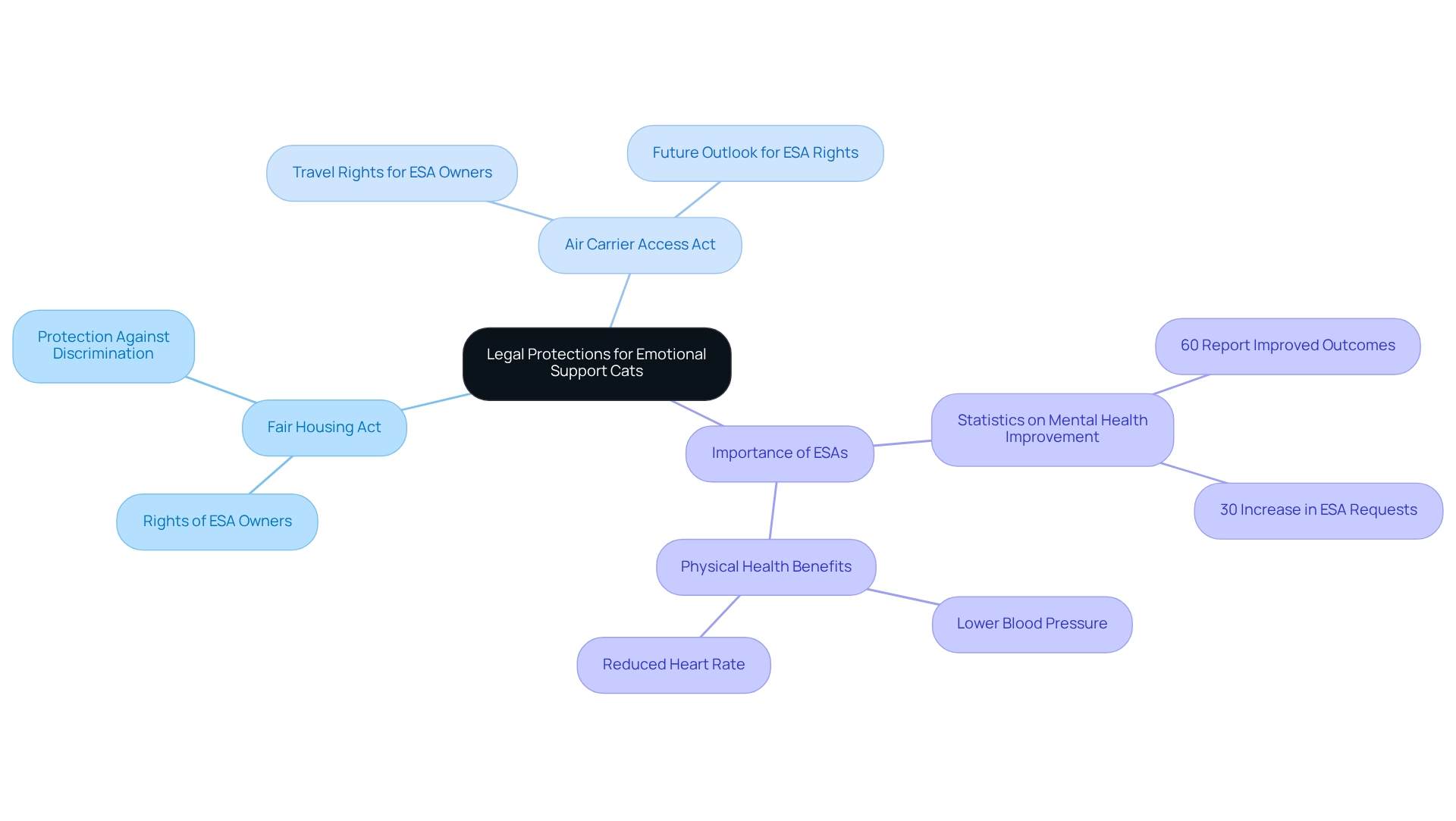
Qualifying Mental Health Conditions for ESA Cats
Many individuals seeking a companion cat often grapple with mental health challenges such as anxiety disorders, depression, PTSD, and bipolar disorder. These struggles can significantly impact daily life, leaving people feeling isolated and overwhelmed. It’s important to recognize how these conditions can hinder one’s ability to thrive. The presence of an emotional support animal cat can provide much-needed comfort and support, making the process of obtaining an Emotional Support Animal (ESA) letter a vital step toward healing.
To qualify for an ESA letter, it is essential to demonstrate how these conditions impair daily functioning. Consulting with a licensed mental health professional is a critical part of this journey. They can assess your unique needs and provide the necessary documentation that validates the therapeutic benefits of having a cat by your side. This step is not just procedural; it’s a pathway to finding solace and companionship.
Research shows that therapy animals can play a crucial role in promoting mental stability and overall well-being. For those coping with PTSD, a cat’s companionship can ease symptoms and enhance quality of life. Imagine coming home to a soft purr, a gentle nudge, or a warm presence that helps to alleviate the weight of anxiety. Real-life stories abound of individuals who have found comfort and solace in their ESA cats, reinforcing the importance of these animals in therapeutic settings.
Ultimately, acquiring an ESA letter not only affirms the necessity for a comfort cat but also opens the door to essential adjustments that can significantly enhance mental health outcomes. You are not alone in this journey; support is available, and the love of a companion cat can be a transformative part of your healing process.
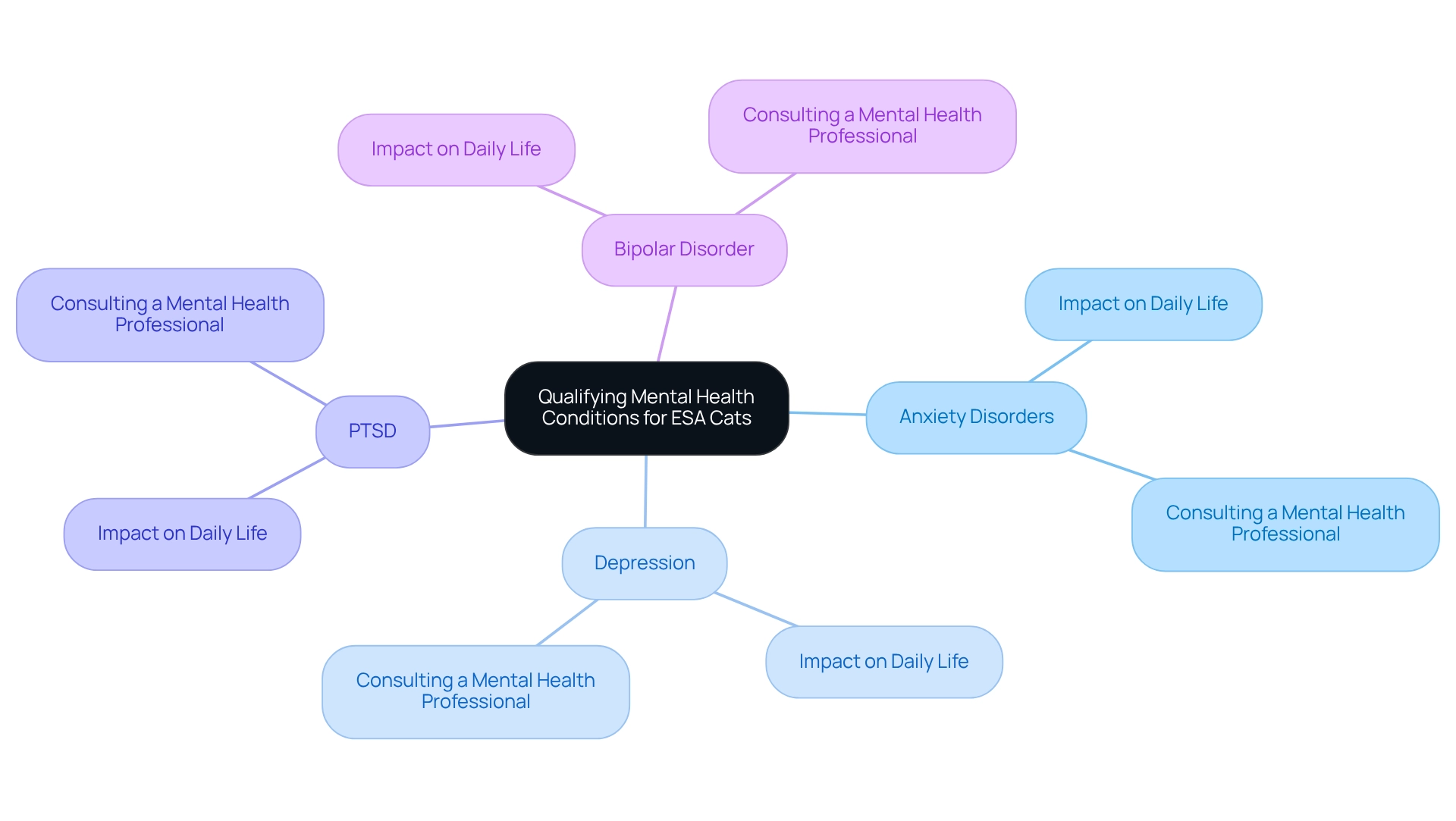
Integrating Your ESA Cat into Daily Life and Routines
Incorporating an emotional support animal cat into everyday life is more than just a routine; it’s a heartfelt commitment to nurturing well-being for both the owner and the emotional support animal cat. Regular activities such as:
- Feeding
- Playtime
- Grooming
not only deepen the bond between you and your cat but also enhance their overall happiness and health. Imagine how creating a safe and comfortable environment can significantly reduce stress for both of you, fostering a sense of peace and security.
Setting aside dedicated time for relaxation and companionship is equally crucial. This practice not only enriches the psychological support provided by your emotional support animal cat but also allows you to fully embrace the therapeutic benefits of your furry friend. Research shows that organized routines can lead to improved mental health outcomes, reinforcing the uplifting impact of pet ownership on your emotional well-being. By prioritizing these daily interactions, you can cultivate a nurturing atmosphere that not only enhances your mental health but also strengthens the bond with your emotional support animal cat.
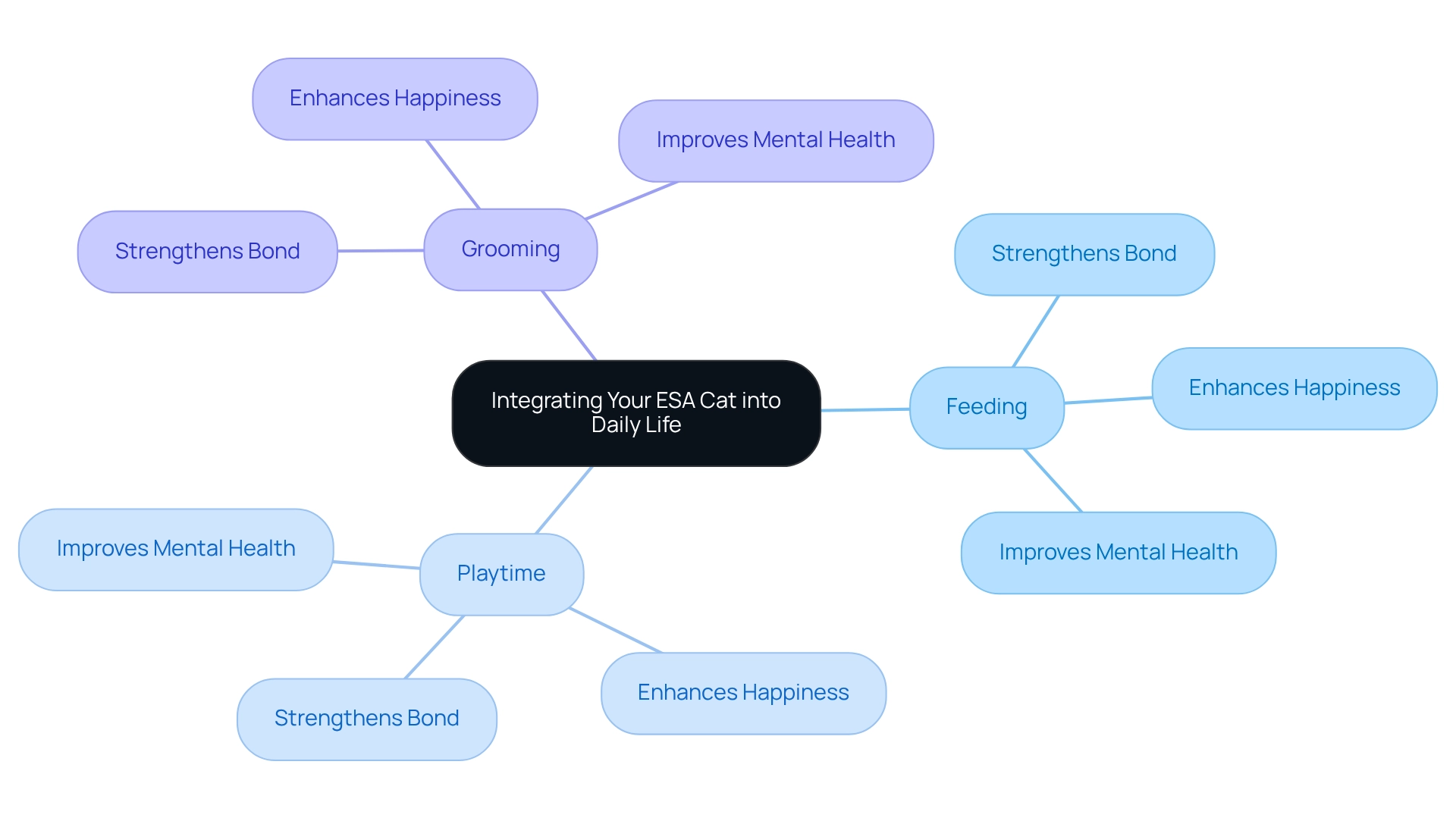
Financial Considerations: Costs and Insurance for ESA Cats
Having a companion cat can bring both joy and financial responsibilities, including food, veterinary care, and essential supplies. While the initial financial commitment may appear daunting, many pet owners discover that the emotional benefits far outweigh these costs. For example, the average annual expenditure for cat care typically ranges from $500 to $1,200, influenced by factors such as dietary choices, healthcare, and grooming needs.
It’s important to recognize that some insurance policies may cover specific expenses related to therapy animals, although the extent of coverage can vary widely among providers. Financial experts highlight the significance of exploring pet insurance options that can help ease some of these financial burdens. In fact, statistics reveal that about 30% of pet insurance policies now include provisions for therapy animals, reflecting a growing acknowledgment of their therapeutic role in our lives.
Consider the stories of those who have benefited from obtaining ESA letters. One particularly inspiring example shows that individuals who secured ESA letters saved an average of $300 each year on housing-related costs, thanks to increased access to pet-friendly accommodations. Moreover, pet insurance can cover various expenses linked to ESA cats, including routine veterinary visits and emergency care, making it a worthwhile consideration for those contemplating the addition of an ESA to their lives.
As the landscape of pet insurance continues to evolve, it’s essential for ESA owners to remain informed about their options. Recent discussions among insurance experts emphasize the push for broader coverage for therapy animals, recognizing their vital role in enhancing mental well-being. By understanding the financial implications and exploring available insurance alternatives, prospective ESA owners can ensure their beloved pets receive the necessary care while also enjoying the comfort and companionship they provide.
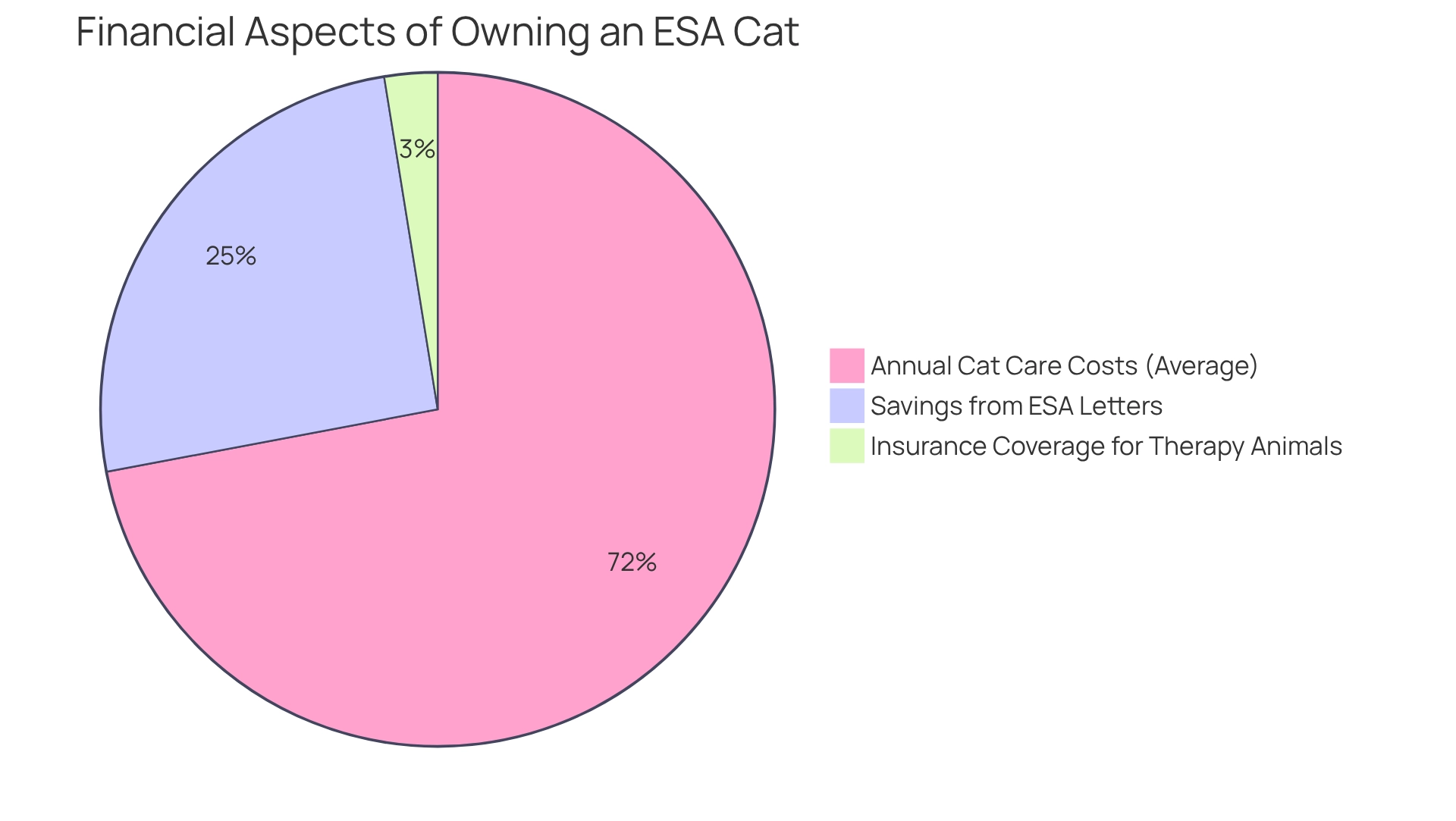
Training and Socialization for Effective Emotional Support Cats
While companion cats may not require specialized training, a foundation of basic obedience and socialization can significantly enhance their effectiveness in your life. Have you ever noticed how a little encouragement can lead to positive behaviors? By using positive reinforcement techniques, such as treats and praise, you can foster a loving environment that nurtures your cat’s development.
Additionally, introducing your cat to various environments, people, and other animals can alleviate anxiety and promote adaptability. This thoughtful preparation not only strengthens the bond between you and your emotional support animal cat but also enriches the overall experience of companionship, making it more harmonious and fulfilling.
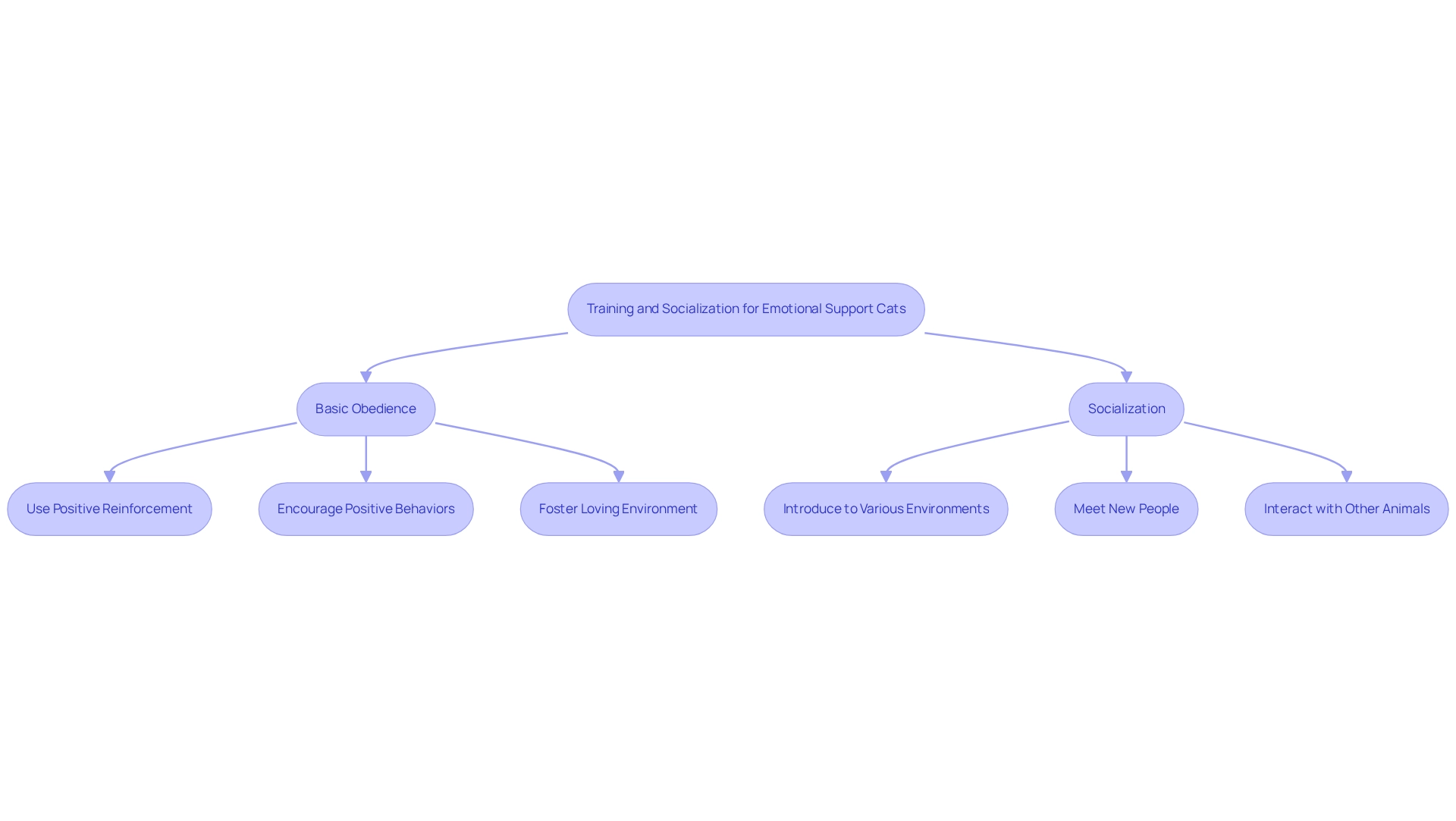
Understanding the Difference: ESA Cats vs. Service Animals
Emotional support animals (ESAs) and service animals play distinct yet vital roles in supporting individuals with disabilities. For many, the companionship of an emotional support animal cat offers essential comfort and relief from mental health challenges. In contrast, service animals are specially trained to perform specific tasks that assist individuals with disabilities. It’s important to understand that under the Americans with Disabilities Act (ADA), only dogs and, in some cases, miniature horses qualify as service animals. This distinction is crucial for ESA owners, as it outlines their rights and the limitations of their animals in public spaces.
A significant aspect of the legal framework surrounding ESA letters is the requirement of a 30-day client-provider relationship before such a letter can be issued. This regulation aims to prevent misuse and emphasizes the importance of legitimate documentation for ESA owners, empowering them to advocate for their rights effectively. Yet, misunderstandings about the differences between ESAs and service animals persist, leading to unrealistic expectations and actions from pet owners. This confusion can negatively impact both those who genuinely need assistance animals and the broader community.
Legal experts stress the necessity for clarity in the regulations governing ESAs. Deni Elliott, a knowledgeable advocate for disability and service dogs, supports the development of a cohesive federal law to standardize the treatment of assistance animals across states. Such legislation would help alleviate the inconsistencies that currently exist, especially regarding ESA rights under the ADA as of 2025. Furthermore, obtaining certification for service dogs from recognized organizations can enhance their credibility and ensure they have received the proper training, which is vital for their public access rights. Understanding these distinctions not only empowers ESA owners but also fosters a more informed public dialogue about the rights and responsibilities associated with assistance animals.
At Wellness Wag, we are dedicated to breaking down barriers and ensuring that everyone has the opportunity to experience the life-changing benefits of companionship with an emotional support animal cat. We believe that by providing support and clarity, we can help individuals navigate their emotional journeys with compassion and understanding.
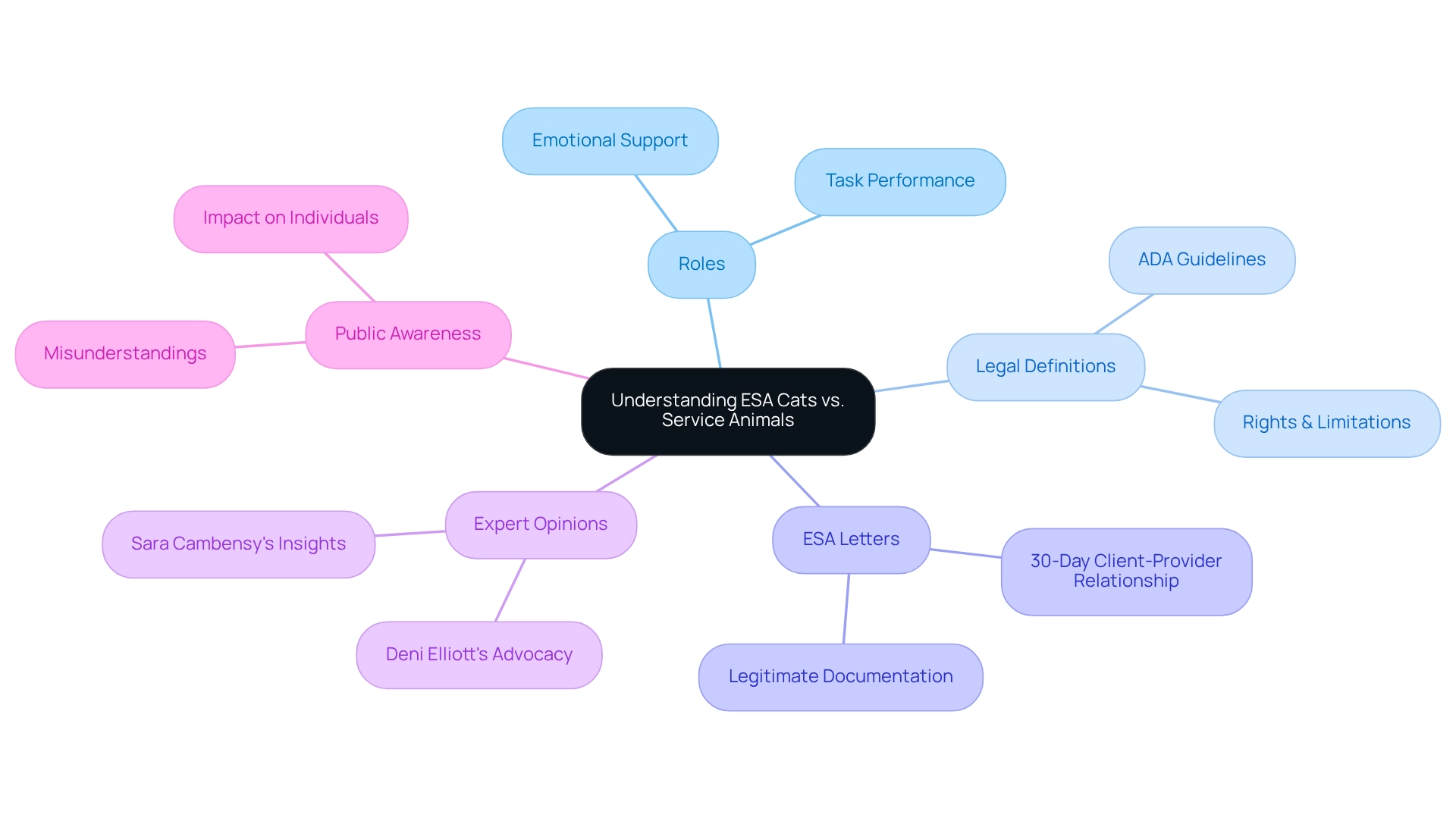
Real-Life Transformations: Testimonials from ESA Cat Owners
Many individuals have shared heartfelt accounts of the transformative benefits their companion animals have brought into their lives. For instance, one owner recounted how their emotional support animal cat helped alleviate severe anxiety, allowing them to engage more fully in social situations. Another touching story emphasized the companionship that an emotional support animal cat provided during a difficult period of grief, helping the owner rediscover joy in daily life.
Linda S. expressed her gratitude, stating, “Applying for an ESA through Wellness Wag was the best decision I made. It was an effortless process and the team was very professional.”
These personal narratives not only illustrate the profound psychological support that emotional support animal cats provide but also resonate with research indicating that approximately 74% of owners of emotional support animal cats report improved mental well-being after welcoming their pets into their lives.
It’s also essential to understand that an ESA letter is valid for one year and requires annual renewal, highlighting the ongoing commitment involved in ESA ownership. Additionally, Wellness Wag’s recent introduction of pet insurance alternatives further underscores their dedication to providing comprehensive support for mental well-being.
Such real-life stories illuminate the vital role that emotional support animal cats play in enhancing mental health and fostering resilience when facing life’s challenges.
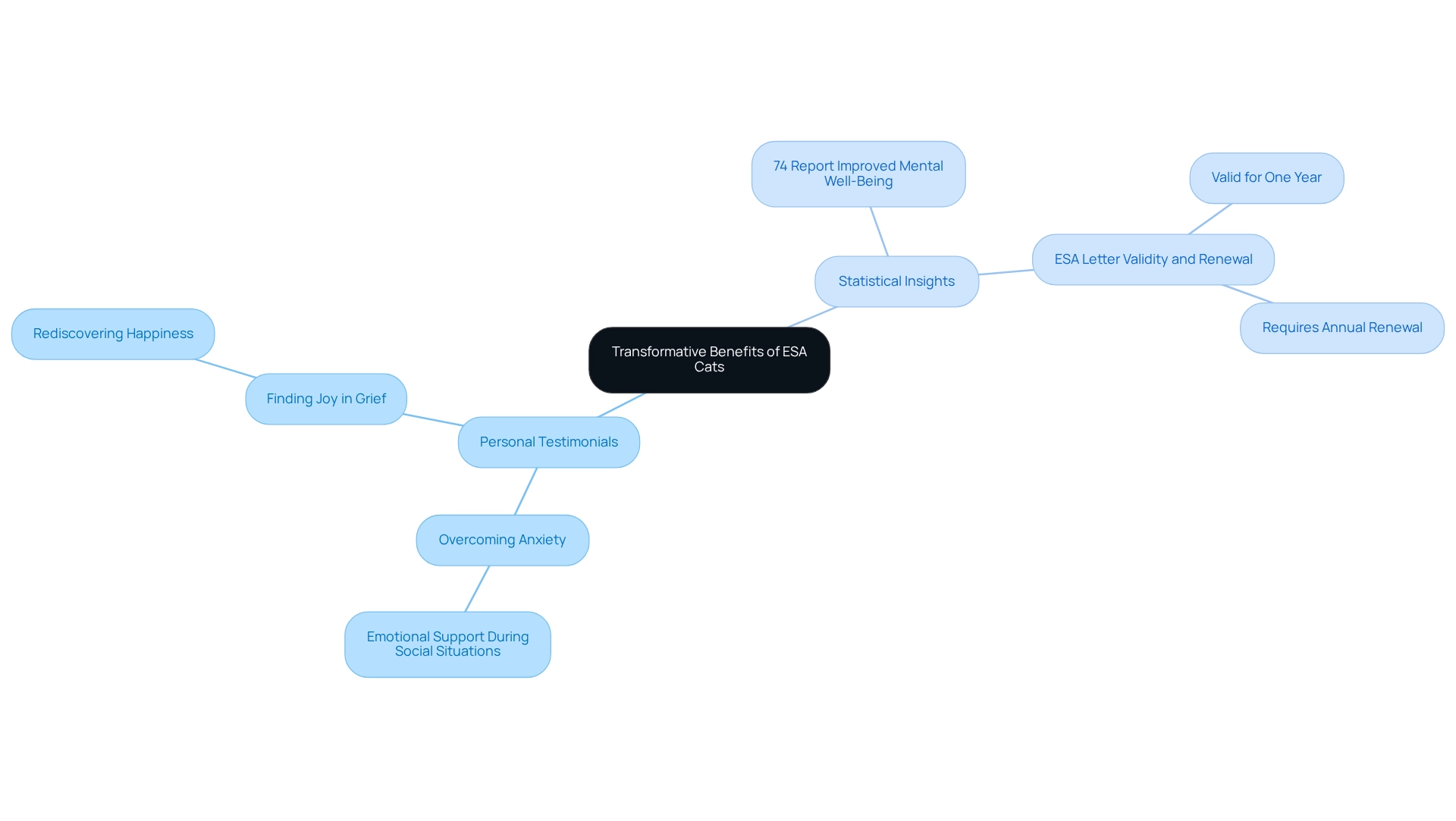
The Overall Impact of ESA Cats on Quality of Life
The presence of an emotional support animal cat can profoundly enhance a person’s quality of life. Many individuals grapple with feelings of loneliness and anxiety, and an emotional support animal cat can offer unconditional love and companionship that can ease these burdens. Their soothing presence often leads to improved mental stability, better sleep quality, and a renewed sense of purpose. As more people recognize the benefits of assistance animals, the demand for emotional support animal cats continues to rise, underscoring their essential role in mental health treatment. Flexible payment plans for obtaining ESA letters start as low as $32.25, making these vital services accessible to working professionals.
Emma, the mother of Jack, a 12-year-old boy who has thrived with the companionship of his cat, Cat Noir, shared, ‘There must be so many individuals out there who could gain in the way my son has.’ This heartfelt quote highlights the broader impact of ESA animals on families, inviting us to reflect on how such support could transform lives. As awareness of the benefits of emotional support animal cats expands, their role in alleviating mental health challenges becomes increasingly crucial. Through the compassionate support of ESA letters, individuals can find the help they need to navigate their emotional journeys.
Conclusion
The companionship of emotional support cats holds remarkable power in transforming lives, particularly for those grappling with mental health challenges. Many individuals face daily struggles with anxiety, depression, and PTSD, feeling overwhelmed and isolated. These furry friends not only provide comfort but also serve as essential allies in alleviating these symptoms. Obtaining an ESA letter through services like Wellness Wag ensures that individuals can quickly access the support they need, reinforcing the importance of timely documentation in fostering emotional well-being.
Legal protections under the Fair Housing Act and the Air Carrier Access Act empower ESA owners, ensuring their right to live and travel with their cats. Understanding the distinctions between emotional support animals and service animals is crucial for navigating these rights effectively. This clarity helps individuals advocate for themselves and their companions. Testimonials from real ESA cat owners serve as powerful reminders of the profound impact these companions have on enhancing mental health and overall quality of life.
Ultimately, emotional support cats play a vital role in promoting emotional stability and resilience. Their presence not only alleviates feelings of loneliness but also encourages routines that benefit both the owner and the pet. As awareness of the benefits of ESA cats continues to grow, so does the recognition of their essential role in mental health care. Embracing the companionship of an ESA cat could be a transformative step toward a more fulfilling and emotionally stable life. Have you considered how an ESA cat might bring comfort and joy into your life? You are not alone in this journey, and support is available to help you thrive.
Frequently Asked Questions
What services does Wellness Wag provide for obtaining ESA letters?
Wellness Wag offers a quick and reliable process for obtaining emotional support animal (ESA) letters, including a brief assessment for eligibility and personalized consultations with licensed medical professionals.
How quickly can clients receive their ESA letters from Wellness Wag?
Clients can receive their official ESA letter within 24 hours after approval, facilitating access to necessary housing and travel accommodations.
Why is prompt access to ESA letters important for individuals experiencing mental health challenges?
Quick access to ESA documentation can alleviate anxiety and enhance overall well-being, allowing individuals to secure the companionship of their emotional support animal without unnecessary delays.
What benefits do emotional support animal cats provide to individuals with mental health issues?
Emotional support animal cats can significantly alleviate symptoms of anxiety, depression, and PTSD, offering comfort and companionship that helps counter feelings of isolation.
What legal protections do emotional support animal cats have under housing and travel laws?
Under the Fair Housing Act and the Air Carrier Access Act, individuals with valid ESA letters are allowed to live with their cats in pet-restricted housing and travel with them on airlines without facing discrimination.
How do these legal protections impact the rights of ESA owners?
These laws prohibit landlords from denying tenants the right to keep their emotional support cats, ensuring a supportive living environment for those who rely on them for psychological support.
What is the difference between service dogs and emotional support animals regarding legal rights?
While service dogs enjoy full public access rights under the Americans with Disabilities Act (ADA), emotional support animals, including cats, have specific protections that can vary and do not have the same public access rights.
What statistics highlight the impact of emotional support animals on mental health?
Around 60% of people with assistance animals report improved mental health outcomes, and there has been a 30% increase in ESA requests over the past five years, indicating a significant demand for these animals.
Certify Your Emotional Support Animal Today

Why You Can Rely on Us?
At Wellness Wag, we believe your pet deserves care rooted in both science and compassion. Each article is carefully researched, written in clear language for pet owners, and then reviewed by qualified professionals to ensure the information is evidence-based, current, and practical for real-life care. Our goal is to help you feel confident in making informed decisions about your pet’s health and well-being.
Reviewed by
Angela Morris, MSW, LCSW
Angela is a licensed clinical social worker with 20 years of experience in patient advocacy and community mental health. She has assisted numerous clients with ESA evaluations and brings a deep understanding of disability accommodations, ensuring that all information is accurate, supportive, and practical.

Written by :
Lena Park
Last Updated :
July 9, 2025












